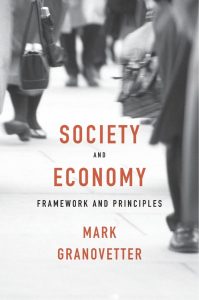It’s fair to say the average economist doesn’t pay much attention to sociologists, but to the extent that (s)he does, Mark Granovetter will be a familiar name. His concept of the distinct roles of ‘strong’ and ‘weak’ ties has become widely-cited in the economics literature. Now Granovetter, a Professor of Sociology at Stanford, has published a new book – intended as the first of two volumes – aiming at a synthesis of his views on how the economy and society are enmeshed with each other (it’s out in 2 weeks, can be pre-ordered now)
. Society and Economy: Framework and Principles, sets out at a high level of abstraction definitions and relationships between concepts such as trust, power, norms, values, as they relate to economic decisions and actions.
The book starts out by quite fairly skewering the ‘Just So’ character of some economists’ uses of sociological concepts to explain how economic norms or institutions have come about. The book suggests that if economics wants to use a concept such as ‘social norm’, then it must engage with questions of how norms come about, which will involve cognition and emotion and social relations. Economics has of course started to dabble in psychology with the ‘behavioural’ revolution, but in the limited sense of simply noting behavioural regularities. Here Granovetter echoes Daniel Hausman (Preference, Value, Choice and Welfare) in arguing that it “does not seem a good recipe for scientific progress” to claim that how people reach economic decisions, or how groups settle on social norms, is simply outside the domain of economics.
If this seems a bit high-fallutin, just consider how much influence social norms have on outcomes. In the 1970s, for corporate executives to pay themselves many hundreds of times what they paid their average employee lay outside the ‘moral economy’ of the times; within a generation that norm had shifted entirely. Surely it is important for economists to understand how that came about?
The book has a particularly interesting chapter on trust, which notes that the outcome of trusting behaviour can arise for different reasons. Granovetter argues that many researchers define trust narrowly to be trust due to their favourite reason, whether that’s an internal psychological state, or an expectation of reciprocal behaviour, or risk-taking with regard to others’ behaviour for some expected benefit.
The promised second volume will apply the concepts defined and analysed in this first volume to specific topics such as corporate governance, organisational forms, and corruption. That’s something to look forward to – this first volume is pretty abstract as it concerns definitions and methodological debates in the literature. Still, the challenge to economists is a fair one, I think. We don’t all have to become competent psychologists or sociologists, but I agree that somehow economics does have to take up the methodological challenge of making sure our borrowing of concepts such as trust or norms is meaningful.

